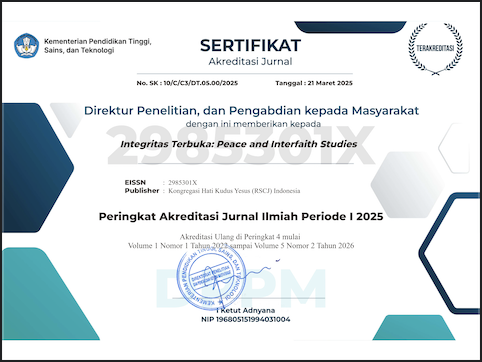
About the Journal
Integritas Terbuka: Peace and Interfaith Studies (E-ISSN 2985-301X) is a peer-reviewed open access journal dedicated to advancing multidisciplinary, interdisciplinary, and transdisciplinary research in the fields of interfaith dialogue and peace studies. The journal provides a platform for critical engagement and scholarly exchange on the dynamics of interreligious encounters, peacebuilding practices, and the role of faith-based wisdom in fostering harmony within contemporary pluralistic societies. <<Read more>>
Current Issue

Integritas Terbuka: Peace and Interfaith Studies Vol. 4 No. 2 (2025) presents eight scholarly articles that critically examine peacebuilding, interfaith relations, ideology, and social transformation within contemporary global and Indonesian contexts. This edition brings together diverse theoretical and empirical perspectives, ranging from ideological critiques of sustainable development and ecological capitalism, debates on Pancasila, nonreligion, and human rights, to hermeneutical analyses of Qur’anic war verses and their relevance to contemporary challenges of radicalism. Other contributions explore collective trauma healing through interfaith youth peacebuilding in the Global South, inclusive education as a peace practice in Islamic schooling, and critical readings of social domination and alienation in modern literature. Several articles also address the transformation of religious discourse and interfaith engagement amid sociopolitical and technological change, including a critical reappraisal of the concept of Islam Nusantara and an analysis of how interfaith dialogue shifts from institutional authority to digital actors.
This issue features eight articles written by contributors from Indonesia, Kenya, Türkiye, and Italy (4 countries), affiliated with a wide range of academic, civil society, and religious institutions, including Parahyangan Catholic University Bandung, Universitas Gadjah Mada, UIN Sunan Gunung Djati Bandung, Universitas Pendidikan Indonesia, Initiatives of Change Indonesia and Kenya, Religious Formation of the Sacred Heart of Jesus (RSCJ) Rome, and Ibn Haldun University Türkiye. Together, these articles reaffirm Integritas Terbuka’s commitment to advancing critical, interdisciplinary, and globally engaged scholarship on peace and interfaith studies in an era of complex social transformation.
Articles
| Journal title | Integritas Terbuka: Peace and Interfaith Studies |
| DOI Prefix | 10.59029/int by Crossref |
| Frequency | Two issues per year |
| Online ISSN | 2985-301X |
| Editor-in-chief | Mochamad Ziaul Haq |
| Accreditation | Sinta 4 on Decree 10/C/C3/DT.05.00/2025 and Accreditation certificate |
| Publisher | Program Integritas Terbuka, Kongregasi Hati Kudus Yesus (RSCJ) Indonesia |
|
Citation Analysis |
|
  |


















